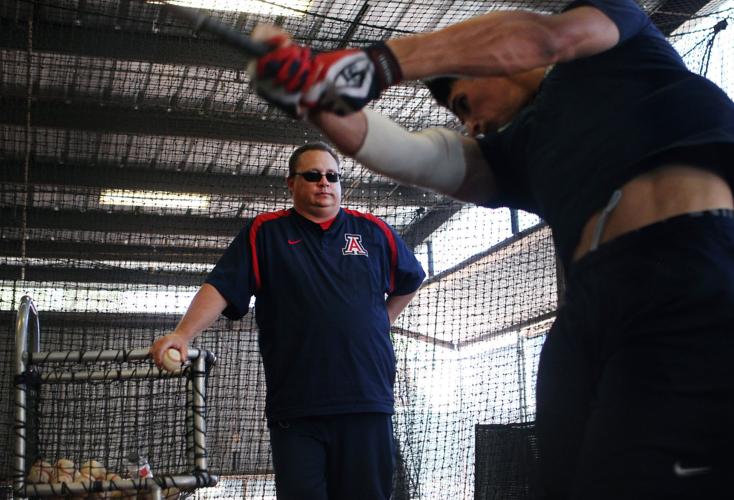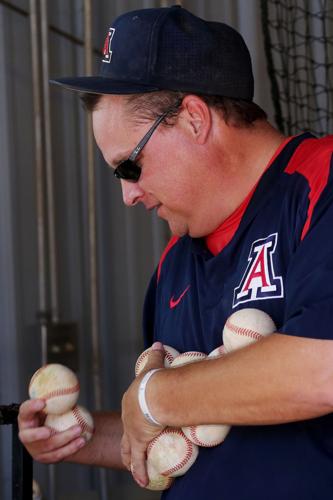LUBBOCK, Texas — The guru behind the most prolific offensive lineup in the Pac-12 is a bespectacled, stocky, sarcastic former pitching coach who rarely goes by his given name and doesn’t get paid a cent by the university he represents. He’s the guy behind the guy.
Marc Wanaka — or, as most call him, “Chief” — is the Arizona Wildcats’ primary hitting instructor. His official title is volunteer assistant coach. He is the Ernie Adams to Jay Johnson’s Bill Belichick — the behind-the-scenes confidante instrumental to his team’s success.
Arizona is about to play in its second NCAA Tournament in as many seasons under Johnson, opening against Sam Houston State on Friday in the Lubbock Regional. The Wildcats reached the College World Series finals last year, and their offense took it up another notch this year. Arizona paces the Pac-12 in just about every important batting category.
Wanaka, 40, never would take credit for the Wildcats’ patience and extra-base power; he’s too self-effacing for that. Don’t worry, though: Others are eager to acknowledge Wanaka’s integral role.
“If you want to hit at any hour, Chief’s there,” senior shortstop Louis Boyd said. “If you have a question … he’s there. He probably knows your swing better than you do.”
“He’s willing to put in countless hours of work when you need him the most,” said junior outfielder Cal Stevenson, who also worked with Wanaka at Nevada in 2015. “I love that guy. He’s done a lot for me.”
Stevenson batted .359 as a freshman for the ’15 Wolf Pack, who led the nation in on-base percentage. Three UA seniors — Ryan Aguilar, Zach Gibbons and Cody Ramer — had career years in ’16 as the Wildcats far exceeded all outside expectations. All-conference selections JJ Matijevic, Alfonso Rivas and Jared Oliva, among others, improved dramatically at the plate this year.
What makes Wanaka such an effective hitting coach? UA pitching coach Dave Lawn, who has worked alongside Wanaka the past four seasons, cited his colleague’s capacity to connect with players — each of whom has his own idiosyncrasies undetectable to the untrained eye.
“He really, really relates well with the guys,” Lawn said. “It’s almost like he’s got this individual back-and-forth that’s unique to each kid.
“They only get 30 swings out there a day, 40, 50,” Lawn continued, gesturing toward the playing field at Hi Corbett. “They’re taking a million swings in the cages, and he’s the one in there, establishing that connection.”
‘Total baseball junkie’
Wanaka’s ability to get through to so many different personalities with so many different swings stems from a long career as a coaching everyman at several obscure stops throughout the West.
Wanaka first met Johnson when they played together at Shasta College in Redding, California. Wanaka was a pitcher, Johnson a middle infielder. They immediately bonded over baseball.
“Total baseball junkie,” Johnson said, recalling hourslong car rides during which baseball was the sole topic of conversation. “From the first day that I met him you could see that.”
The two soon went their separate ways but stayed in touch. Wanaka coached pitchers and catchers on the same staff as Johnson at Point Loma Nazarene in San Diego in 2003. While Johnson worked his way up the coaching ladder, Wanaka toiled in relative anonymity.
Three seasons at New Mexico Highlands. Six at El Paso Community College. Four at San Diego’s Mesa College.
Those experiences proved invaluable. Wanaka had every job imaginable, on and off the field. That’s how it works at most Division II schools and junior colleges.
“We all had to chip in and help out,” Wanaka said. “You’re shorthanded, short-staffed. So you have to get outside of your primary role. You have to be diversified in what you’re able to do.”
Wanaka served as the pitching coach for El Paso. He also threw batting practice and worked with hitters in the cages, among other duties. They included doing the team’s laundry, making travel arrangements, divvying up meal money, occasionally driving the team bus and tending to the field.
“You mow it, you drag it, you water it, you fertilize it, you seed it, you chalk it,” Wanaka said. “You do everything.”
Having a varied skillset comes in handy while working with hitters. No two swings are the same.
With junior first baseman Matijevic, a left-handed batter, it’s all about control, feel and rhythm. Matijevic batted .238 as a freshman. He raised his average to .287 in Year 1 under the current coaching staff and won the Pac-12 batting title with a .389 mark this season.
With junior outfielder Oliva, a righty, the biggest adjustment was slightly opening his stance so he could see pitches better. Lately, it’s been “loading” earlier and getting his foot down sooner. Oliva is hitting .328 this season — 88 points higher than last year.
With Stevenson, a lefty, in-season adjustments included using his body more — staying behind the ball instead of jumping at it. After a midseason slump dropped his average to .264, Stevenson has upped it to .313.
Stevenson and Wanaka worked together for about three hours last Friday. They started at 11 a.m. for a 7 p.m. game.
“It wasn’t really scheduled,” Stevenson said. “I just showed up and told him what I wanted to do and how I wanted to do it.”
And how did Wanaka respond to that request?
“I’ll meet you out there,” he told Stevenson. “I’m ready to go.”
‘He’s a grinder’
Wanaka and Johnson were working in San Diego at different schools when Johnson got the head job at Nevada. He brought Wanaka along with him, first as a volunteer assistant and then as a full-time assistant. Although he had to move his family — wife Gianni and sons Austin, 14, and Cooper, 10 — Wanaka didn’t hesitate. Nevada was big time.
Arizona was bigger time. So Wanaka again slid into the volunteer role. Division I baseball programs are allotted two full-time assistant positions. Wanaka’s income comes from working camps with Johnson. Gianni works as a secretary in the Vail School District.
“He and his family have figured out a way to make it work,” Johnson said. “Our programs, here and at Nevada, have really benefited from it.”
Wanaka isn’t allowed to recruit. Otherwise, he puts in as much time working with players, studying video and compiling scouting reports along with fellow assistants Lawn and Sergio Brown. Wanaka also coaches Arizona’s catchers and is in charge of positioning the outfielders during games.
“He’s a grinder,” Johnson said. “He’s the volunteer assistant, but he treats it like a full-time job. That’s tough to find in our business.”
Johnson has been described the same way. He and Wanaka have similar roots.
Like Johnson, Wanaka grew up in a small town in Northern California — except smaller and more remote. Weaverville is about 200 miles north of Sacramento. Its population is about 3,600.
Where the name Wanaka (rhymes with Hanukkah) comes from is less clear. His family has researched it, and all they could come up with were a resort town and lake in New Zealand.
Wanaka often is asked if he is Native American or Asian. He is neither.
That didn’t stop Lawn from dubbing him “Chief” when they first met at Nevada. It’s one of those classic baseball locker-room nicknames. It stuck. It suits him.
“Chief” makes Wanaka sound regal. He is anything but. Johnson said the secret to his right-hand man’s success is his willingness to “get in the weeds” when things aren’t going well and stick with players through inevitable struggles. Wanaka’s work ethic rivals Johnson’s.
“There’s people that might tie him,” Lawn said, “but nobody beats him in terms of time spent trying to help the kids be ready.”





